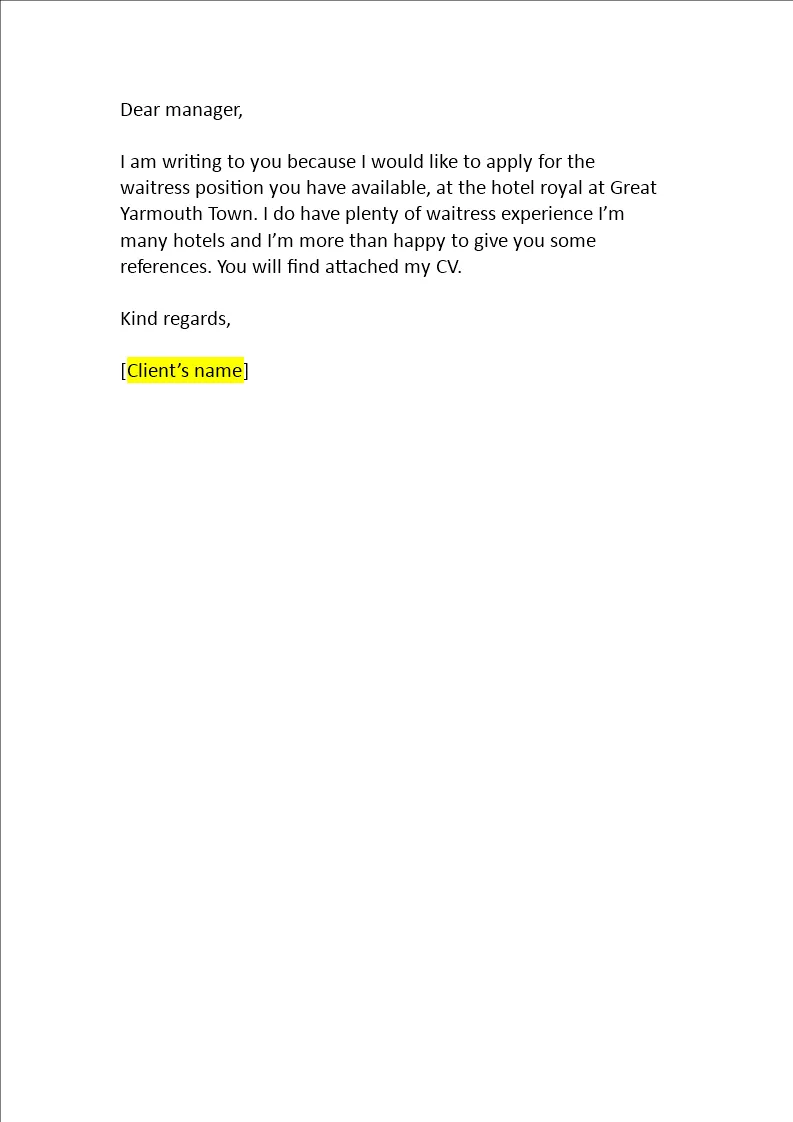Why a Waitressing Cover Letter is Crucial
In the competitive world of waitressing, a well-crafted cover letter can be your golden ticket to landing an interview. While your resume showcases your experience, the cover letter allows you to express your personality, enthusiasm, and suitability for a specific role. It’s your chance to make a strong first impression and highlight why you’re the perfect fit for the restaurant. Without a cover letter, your application might get lost in the pile, as it doesn’t provide the context or personalization that hiring managers look for. This document provides the opportunity to connect your skills with the restaurant’s needs, showing a genuine interest in the position. It also allows you to address any potential gaps in your resume, providing a comprehensive view of your capabilities.
Highlighting Your Skills for Waitressing
Waitressing is more than just taking orders and serving food; it’s a blend of interpersonal skills, multitasking abilities, and a strong work ethic. To impress potential employers, you need to showcase these skills in your cover letter. Focus on the skills most relevant to waitressing, and provide specific examples of how you’ve demonstrated them in the past. The ideal cover letter is personalized to the specific restaurant and role. By highlighting specific skills and providing related examples, your cover letter showcases that you understand the requirements of the job and are the right candidate. Tailor your cover letter to match the job description, and emphasize what they’re looking for.
Customer Service Excellence
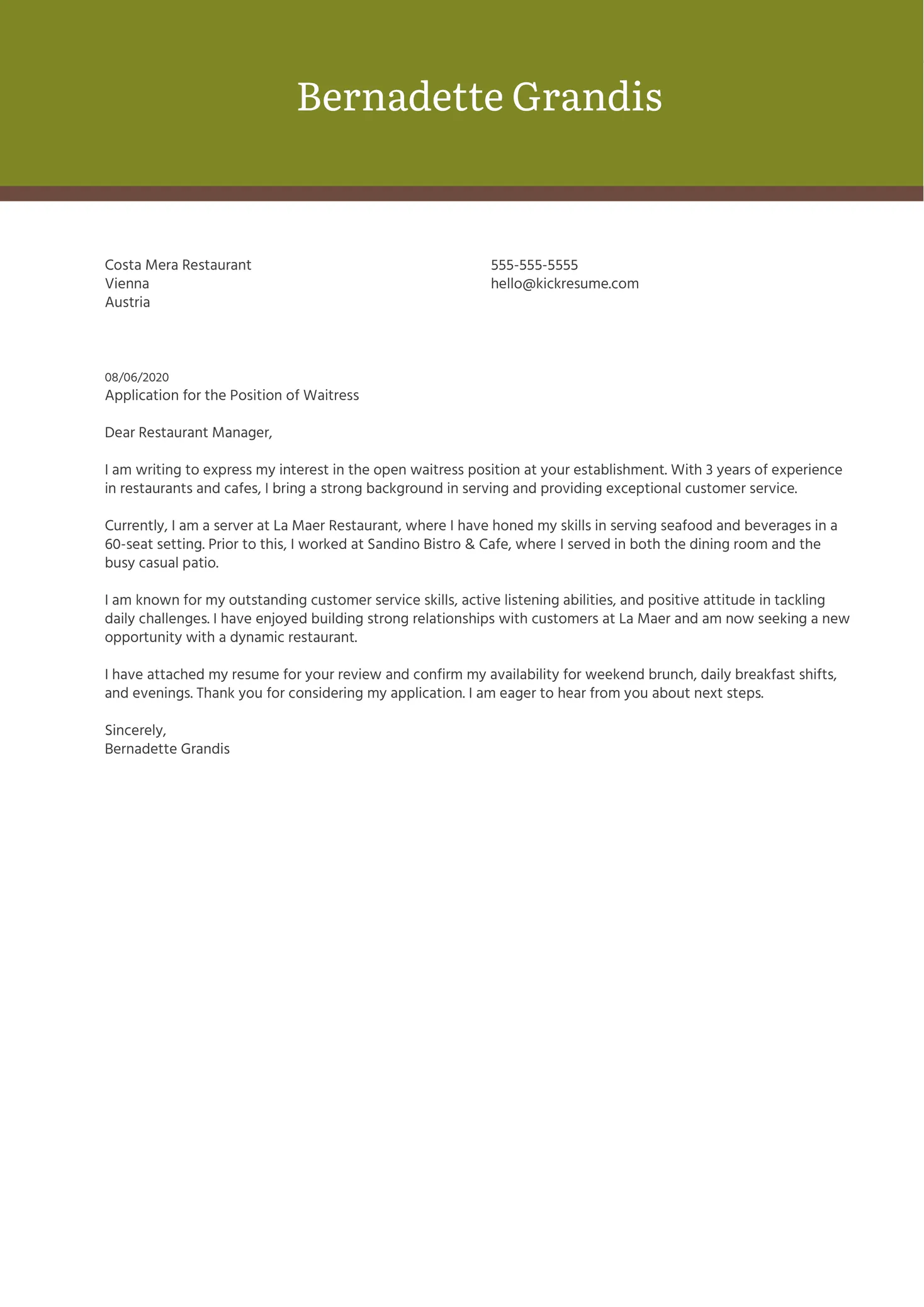
Customer service is the cornerstone of successful waitressing. Highlight your ability to create positive and memorable experiences for guests. Provide examples of how you’ve handled difficult customers, resolved complaints, or gone above and beyond to meet customer needs. Emphasize your ability to remain calm under pressure and your commitment to ensuring customer satisfaction. Mention instances where you received positive feedback from customers or were recognized for your excellent service. Highlighting your dedication to making every customer feel valued and appreciated is vital.
Communication and Interpersonal Skills
Excellent communication is essential for waitressing. Describe your ability to communicate clearly and effectively with both customers and colleagues. Highlight your active listening skills, your ability to explain menu items, and your proficiency in taking accurate orders. Mention any languages you speak in addition to English, as this can be a valuable asset in many restaurants. Providing examples of how you have successfully communicated with diverse groups of people. Emphasize your skills in fostering a team environment.
Experience and Relevant Qualifications
While experience isn’t always mandatory, it significantly boosts your chances. If you have waitressing experience, detail your previous roles, responsibilities, and achievements. Mention any specific training you’ve received, such as food safety certifications or point-of-sale (POS) system proficiency. If you are new to waitressing, emphasize relevant transferable skills, such as customer service experience in retail or volunteer work. Highlighting any accomplishments or awards, such as employee of the month. Mentioning any experience with handling cash or operating a cash register.
Restaurant Knowledge and Skills
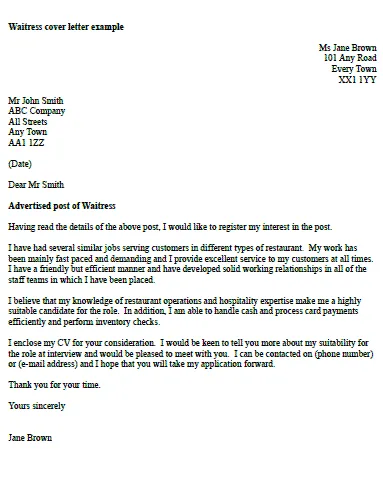
Showcase your knowledge of restaurant operations and your understanding of the role’s demands. Highlight any experience with menu knowledge, food and beverage service, or table setting. Discuss your ability to multitask and work efficiently in a fast-paced environment. Mention your understanding of hygiene standards and your commitment to maintaining a clean and organized workspace. If you are knowledgeable about a particular cuisine or have any specific restaurant skills, be sure to showcase them.
Tailoring Your Cover Letter
One size does not fit all when it comes to cover letters. Customizing your letter to each job application significantly improves your chances of getting noticed. Show the employer that you have taken the time to understand their needs and are the perfect fit for the role. It shows that you have an interest beyond simply wanting any job and that you have researched the company.
Researching the Restaurant
Before you start writing, thoroughly research the restaurant. Visit their website, read online reviews, and, if possible, visit the restaurant to experience their atmosphere and service firsthand. Note any specific details about their menu, ambiance, and customer base. This information will help you tailor your cover letter to demonstrate your genuine interest in the specific establishment. Understanding the restaurant’s values, style, and customer profile will help you align your skills and experience with their needs.
Customizing Your Content
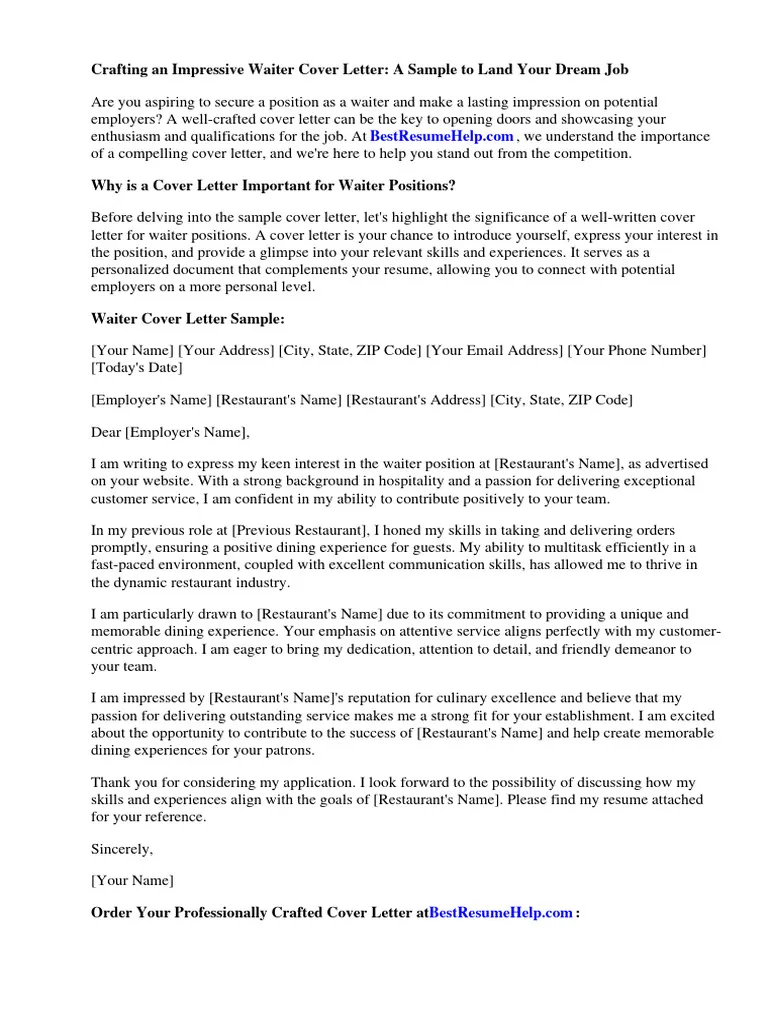
Once you’ve researched the restaurant, use that information to personalize your cover letter. Reference specific menu items, the restaurant’s decor, or any unique aspects that resonate with you. Tailor your skills and experience to match the job description and the restaurant’s requirements. Show how your skills will contribute to the restaurant’s success, and explicitly mention why you’re drawn to this particular establishment. Customization makes your cover letter stand out.
Formatting and Structure
The format and structure of your cover letter are just as important as its content. A well-formatted letter is easy to read and leaves a professional impression. Use a clear and concise format, and ensure the letter is visually appealing and easy to read. Keep it concise and focused on the most relevant information.
The Opening Paragraph
The opening paragraph is your opportunity to grab the reader’s attention. State the position you’re applying for and how you learned about the opportunity. Briefly introduce yourself and express your enthusiasm for the role and the restaurant. Mentioning a mutual connection or any specific aspect that caught your interest. Keep it concise and avoid generic opening lines. Create an initial impression that gets the reader interested in learning more.
Body Paragraphs - Showcasing Your Strengths
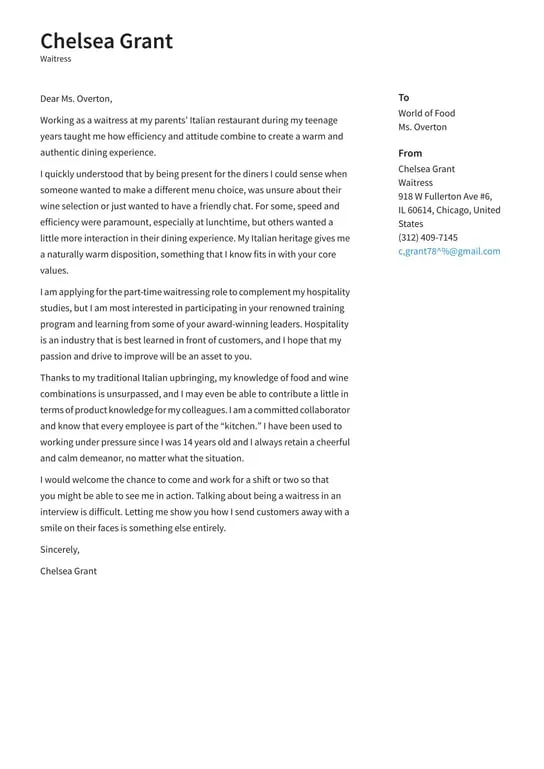
The body paragraphs are where you showcase your skills and experience in detail. Use specific examples to demonstrate your abilities. Focus on achievements and quantifiable results whenever possible. Tailor your examples to match the job description and the restaurant’s needs. Use action verbs to describe your accomplishments. Highlight your ability to adapt to different situations.
The Closing Paragraph
The closing paragraph should reiterate your interest in the position and the restaurant. Thank the hiring manager for their time and consideration. Include a call to action, such as expressing your availability for an interview and providing your contact information. End with a professional closing and your name. Reiterate your key selling points and why you are the right fit for the job.
Proofreading and Editing
Before sending your cover letter, thoroughly proofread and edit it. Ensure that your writing is free of typos, grammatical errors, and spelling mistakes. Consider having a friend or family member review your letter for a fresh perspective. Proofreading helps in making the best impression, as it shows the hiring manager your attention to detail and professionalism. Ensure that the formatting is consistent and that the tone of the letter aligns with the restaurant’s image.
Key Action Verbs for Your Waitressing Cover Letter
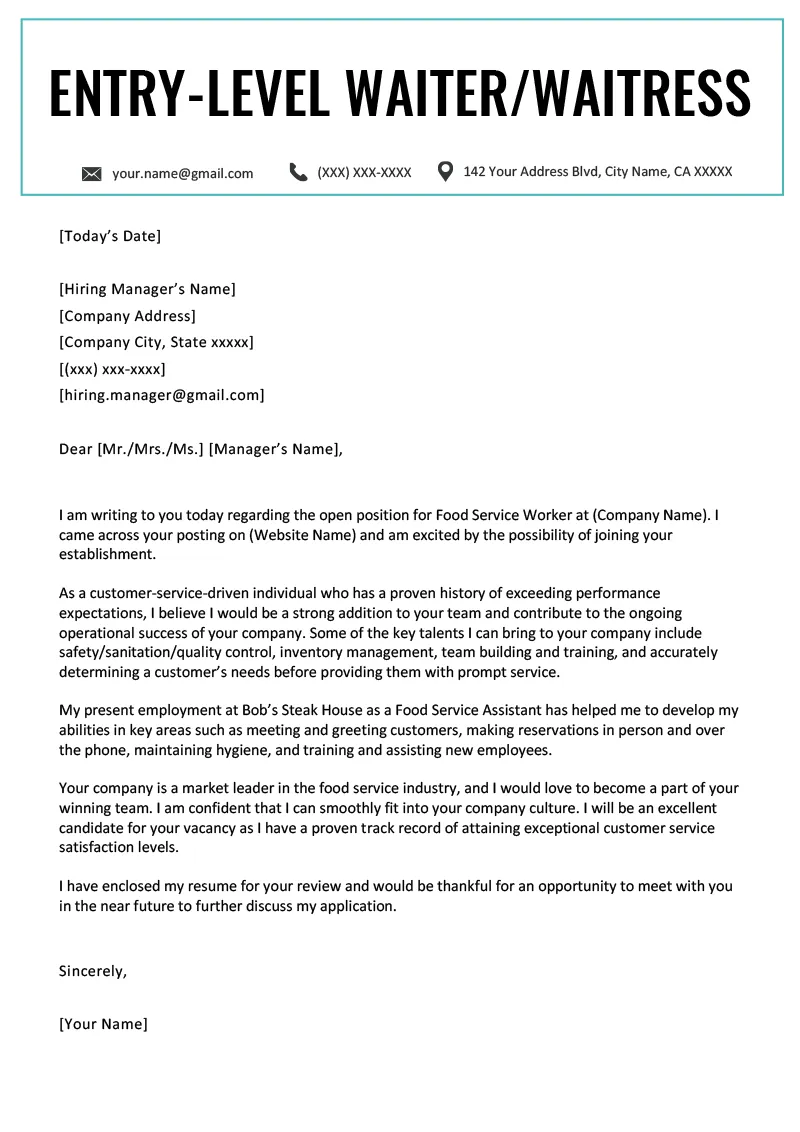
Using strong action verbs can make your cover letter more impactful and engaging. These verbs help to showcase your accomplishments and make you sound more confident. Choosing the right action verbs can give your cover letter a more impressive tone. Consider these verbs as you write your cover letter; they can help to emphasize your strengths and capabilities.
Examples of Action Verbs
Here are some action verbs to consider using in your cover letter. Try to incorporate these to make your cover letter more impactful: Served, Assisted, Managed, Trained, Resolved, Communicated, Provided, Recommended, Handled, Maintained, Delivered, Improved, Increased, and Exceeded. Use these action verbs when describing your experiences and accomplishments, and your cover letter will be more compelling.
Common Mistakes to Avoid
Avoiding common mistakes is essential to create a strong cover letter. Common errors can undermine your application, so it is critical to review your cover letter for any of these. Make sure that your cover letter reflects your professionalism and your suitability for the role.
Generic Language and Clichés
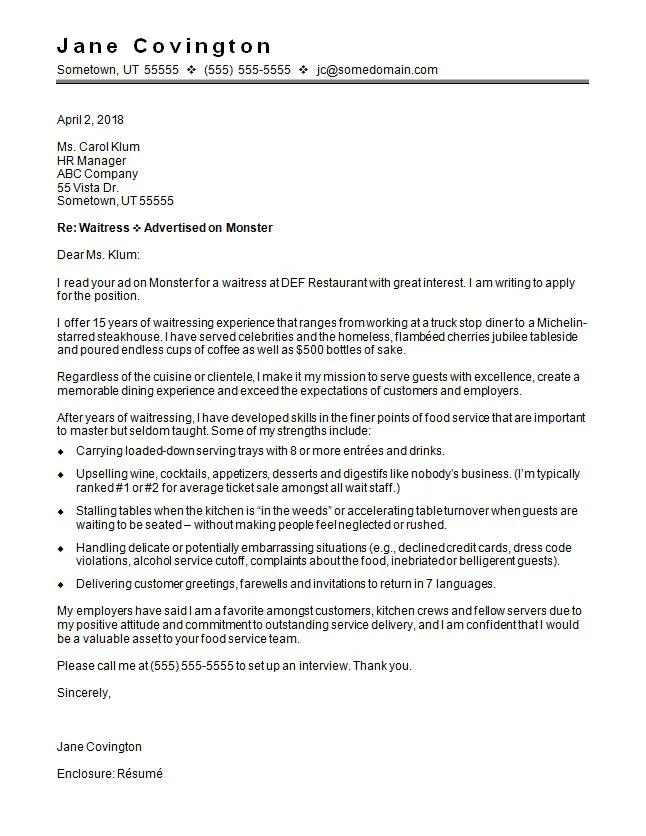
Avoid using generic language and clichés that don’t add any value. Phrases such as “hardworking” or “team player” are overused and don’t provide specific information. Instead, use concrete examples that demonstrate these qualities. Steer clear of clichés and focus on providing unique insights into your skills and abilities. Differentiate yourself by using unique phrasing and content.
Ignoring the Job Description
Failing to address the requirements outlined in the job description is a significant mistake. Tailor your cover letter to the specific needs of the role. Highlight the skills and experiences that align with the requirements mentioned. By doing this, you’re showing the hiring manager that you understand the job’s demands and are the right fit. When you tailor the information from the job description, it increases your chances of getting an interview.
Typos and Grammatical Errors
Typos and grammatical errors can undermine your credibility. Proofread your cover letter carefully before submitting it. Having a friend or family member review your letter can help catch errors you might have missed. Ensure that your writing is polished and error-free, as attention to detail is important in waitressing. Errors show that you do not pay attention to detail, so make sure you have an error-free cover letter.
The Importance of a Strong Closing
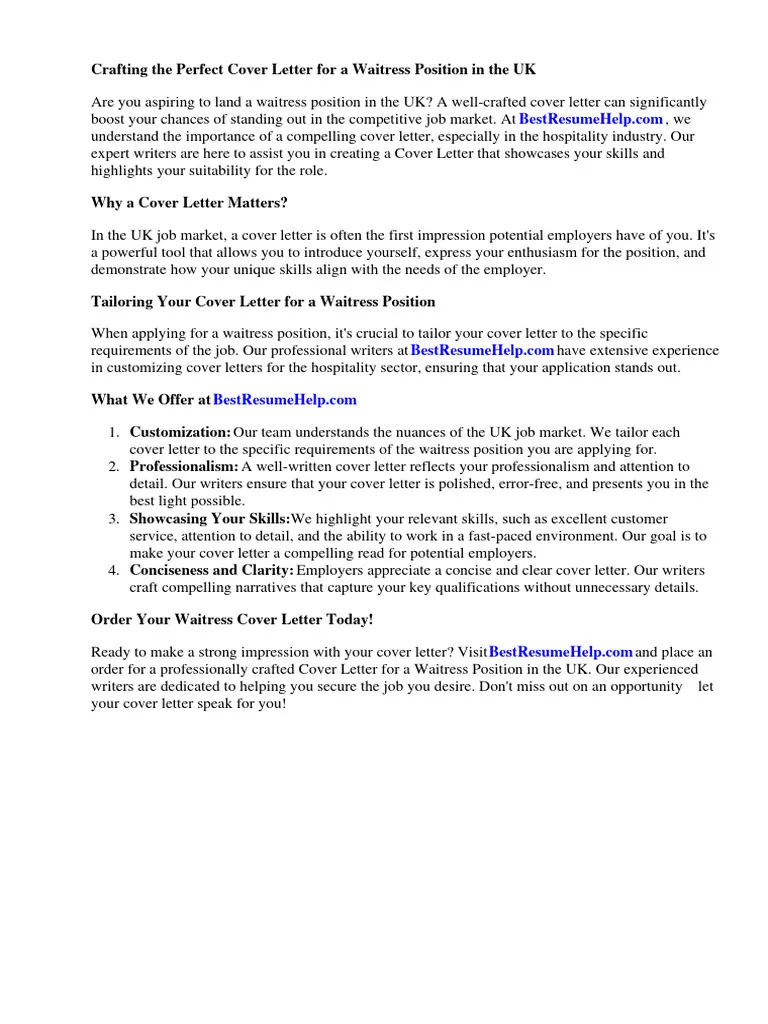
The closing of your cover letter can leave a lasting impression on the hiring manager. Making sure that your closing is clear and impactful is critical for your application. A strong closing paragraph can reinforce your interest in the position and invite the hiring manager to take the next step.
Call to Action
Include a clear call to action in your closing paragraph. This could be expressing your availability for an interview or providing your contact information. Encouraging the hiring manager to take action ensures your cover letter has a clear purpose. Giving the hiring manager a clear call to action gives them direction for the next steps to take with your application.
Expressing Enthusiasm
Conveying genuine enthusiasm for the position and the restaurant is essential. Mention why you’re excited about the opportunity and how you believe you can contribute to the team. Expressing your genuine interest can help you stand out. Show the hiring manager that you are truly invested in the role and that you would like to be working with the restaurant.
Review and Final Touches
Before submitting your cover letter, take the time to review it one last time. Ensure that your application is complete, error-free, and tailored to the specific job you are applying for. A well-crafted cover letter can significantly increase your chances of landing an interview. It is your opportunity to make the best possible impression on the hiring manager. Take the time to refine and proofread your cover letter and make your job application stand out.
